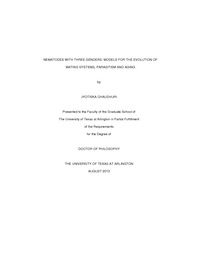| dc.description.abstract | All living organisms reproduce and age. These are the two basic facets of life, but in many aspects poorly understood. The majority of the species are male/female. The proportion of genders in population can vary significantly among animals and plants, but the mechanisms and evolutionary reasons for such variation are poorly understood. In some species of nematode (roundworm) parasites, for example, only female progeny is generated after a cross between a male and female. To understand how gender-ratio distortion happens and how it evolved, we are using a non-parasitic nematode that can be cultured in the laboratory, but that is similar in many aspects to parasitic nematode. For my thesis, I studied the evolution, maintenance and the underlying cellular mechanisms that govern extreme skewed sex ratios in free-living and parasitic nematode species. This knowledge could be used to screen for drugs that further suppress the production of males in the future, helping to eradicate important parasites that cause debilitating diseases worldwide in livestock and humans. Aging rates can vary dramatically in various species, but it is not understood why and how this happens. I found that our model nematode produce two genders that age at significantly different rates and that respond differently to cellular stress, although they are genetically identical. Here, I clarified the mechanism behind this gender difference in lifespan. This could help design potential targets for drugs to address age-related diseases to improve our health-span in future. | en_US |

